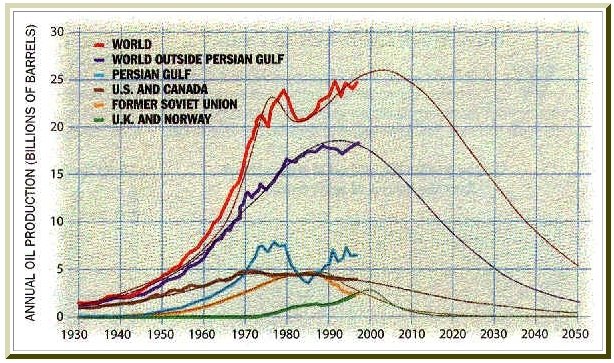
20 years ago, Colin Campbell and Jean Laherrere published an article on “Scientific American” that was to start the second cycle of interest on oil depletion (the first had been started by Hubbert in the 1950s). Their prediction turned out to be too pessimistic, at least in terms of the supply of combustible liquids, still growing today. Yet, it was a valuable warning of things to come, unfortunately ignored by decision-makers worldwide.
The first cycle of interest in oil depletion was started by Marion King Hubbert in the 1950s. Although it provided successful predictions for the production of crude oil in the US, the interest in oil depletion waned in the 1980s. The same destiny of growth and decline awaited the second cycle, that went under the name of “peak oil movement” and that was generated in 1998 by a famous article published by Colin Campbell and Jean Laherrere on “Scientific American.”
Today, the second cycle is winding down and even mentioning the concept of “peak oil” is enough to be branded as a diehard catastrophist, unable to understand how the fracking revolution is leading us to a new age of prosperity under America’s energy dominance. Yet, there are symptoms that the great peak could be finally arriving and – who knows? – a third cycle of interest in oil depletion could be starting.
I published some considerations on this subject in an article that appeared on “Energy Research & Social Science” — it is “open access” and you can find it at this link. After re-examining the story of the peak oil cycle, I conclude that there was no solid reason to reject the peak oil studies, as it was done starting in the mid 2000s. The reasons for the rejection were related more to the incompatibility of the peak oil concept with the (still) current economic views based on the idea that the depletion of natural resources is not — and cannot be — a constraint to economic growth.
It will take time before some concepts percolate from biophysical economics into mainstream economics – if they ever will. In the meantime, humans continue to destroy the resources that make them live, running as fast as they can toward the Great Cliff.
Here is an excerpt from my paper — the conclusions
From “Peak Oil 20 Years Later”
by Ugo Bardi
Energy Research & Social Science
Volume 48, February 2019, Pages 257-261
… Overall, we can say that, even though the role of non-conventional oil sources was not correctly evaluated and the date of the peak missed at the global level, the Hubbert theory produced correct predictions and, in general, a valuable warning of difficulties to come. So, there never were compelling reasons based on historical data to dismiss the peak oil idea as wrong or untenable. Nevertheless, this is what happened.
[..]
Peak Oil, Climate Change, and Limits to Growth – are related to each other and have in common the fact that the models on which they are based predict the unavoidable decline of the world’s economy or, at least, the impossibility for it to keep growing for a long time. This view easily leads to a “doomerish” vision of the future and the peak oil movement tended to regard peak oil as an apocalyptic watershed for humankind, an interpretation surely not based on anything that the model in itself could support. Perhaps in agreement with this millenaristic attitude, the peak oil movement mostly failed to generate a political proposal. This point is well described by Schneider-Matherson [10] who shows how the members of the movement tended to prepare for the event in individual terms, emphasizing local and personal resilience. In some cases, they adopted or proposed a survivalist strategy, including stocking food, guns, and ammunition in expectation of the imminent collapse. Needless to say, this attitude didn’t endear the movement to the mainstream decision makers.
We may therefore conclude that the peak oil predictions were considered incompatible with the commonly held views that see economic growth as always necessary and desirable and depletion/pollution as marginal phenomena that can be overcome by means of technological progress. That was the reason why the peak oil idea was abandoned, a victim of a “clash of absolutes” with the mainstream view of the economic system. In the clash, peak oil turned out to be the loser, not because it was “wrong” but mainly because it was a minority opinion. The future will bring new data and, with them, the concept of peak oil might regain popularity for a second time, just as it did for the first time with the 1998 work of Campbell and Lahérrere.
Ugo Bardi teaches physical chemistry at the University of Florence, in Italy. He is interested in resource depletion, system dynamics modeling, climate science and renewable energy. Contact: ugo.bardi(whirlything)unifi.it











































